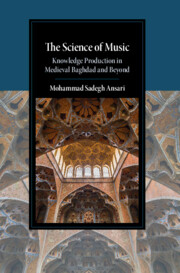Epilogue
Science and Music in the Medieval Islamic World
Published online by Cambridge University Press: 19 December 2024
Summary
In his Truth and Method, Hans-Georg Gadamer argues that during the Enlightenment period, under the influence of Kantian ethics and aesthetics, European intellectuals came to understand aesthetic judgment, or “taste,” as something other than “truth.” Kant, Gadamer continues, legitimated a subjective universality of aesthetic taste that was devoid of any true knowledge of the object. In doing so, he made it impossible to acknowledge the truth claims of the “human sciences.” The consequences of this move, Gadamer points out, were far-reaching, removing all bodies of knowledge not based on “natural science” methodology from the domain of objective knowledge and casting them into the realm of subjective opinion. What is important for Gadamer here is the catastrophic impact of Kant’s analysis on the veracity of ethical truth claims. For me, however, what is interesting is its implications for aesthetic judgment itself. It meant that, for instance, aesthetic judgments about good and bad music – consonance and dissonance – were no longer statements of truth and by extension, no longer scientific. Rather, consonance and dissonance – and music in general – became matters of subjective opinion. For the medieval scholars whose works I have examined in this book, however, Kantian analysis meant nothing. Free from its restrictions, they understood music to be science, and aesthetic judgments of consonance and dissonance to be valid truth claims. At the outset of this book, I posed a series of questions about medieval Islamic understandings of science. Now that I have concluded my examination, it is pertinent to provide answers to those questions.
- Type
- Chapter
- Information
- The Science of MusicKnowledge Production in Medieval Baghdad and Beyond, pp. 177 - 184Publisher: Cambridge University PressPrint publication year: 2025

